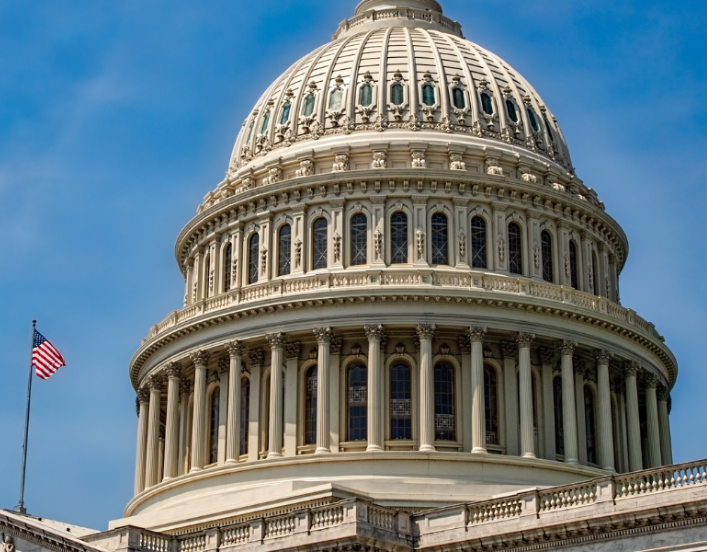Where We Stand: Voting Rights
AAUW is committed to open and fair elections that are broadly accessible to all voters, nonpartisan voter education efforts that will promote equitable political participation and representation in appointed and elected office, and expanding voting rights.
Our democracy works when everyone can fully participate. Elected officials routinely make decisions about issues that directly impact all of us. From our paychecks to paid leave, access to reproductive health care and access to education, our lives are on the line—and our vote is our voice. To create real change, we must be part of the conversation, and the most powerful way for us to have our say is at the polls. Yet the right to vote has a long and tumultuous history. Protecting that right—one that many fought long and hard for—continues today as ongoing efforts to suppress the right negates what it means to live in a free democracy.
AAUW in Action
All public policy actions take direction from the AAUW Public Policy Priorities, voted on by members every two years. AAUW is a nonpartisan organization—but nonpartisan does not mean “non-political.” Since its first meeting in 1881, AAUW has been a catalyst for change. Together, through our coordinated and strategic advocacy, we’ve enacted invaluable legislation at the federal, state, and local levels. The 2021-2023 Public Policy priorities directly identify expanding voting rights.
The public policy team engages in many efforts on this key issue, including but not limited to:
- Working in coalition with other gender equity and civil rights organizations, like the Freedom to Vote Campaign led by Rock the Vote and partnering on National Voter Registration Day.
- Mobilizing AAUW advocates and members through targeted calls to action on important legislation, like the Freedom to Vote Act and the John Lewis Voting Rights Advancement Act.
- Engaging directly with elected leaders through calls, letters to political offices, comments and testimony in hearings, and statements on unfolding events.
- Providing voter education resources on key equity issues to consider during elections, how COVID-19 may impact access to voting, and how elected officials have voted in the past (more about this and Get Out the Vote guides at the AAUW Action Fund).
Understanding History
More than a century ago, the 15th Amendment guaranteed the right of all men to vote regardless of race, color, or previous condition of slavery. Fifty years later in 1920 the 19th Amendment gave some women the right to vote. It wasn’t until decades more of racially discriminatory practices like literacy tests, poll taxes, and Jim Crow laws that the right to vote for everyone was written into law with the Voting Rights Act of 1965. Despite this landmark legislation, some communities were still unable to equitably access their right to vote. The 1975 amendments to the Voting Rights Act required that all voting materials be made available in multiple languages and ensured the right to vote for Asian Americans, Latinos, and Native Americans.
What It Says: The Voting Rights Act of 1965
Broadly speaking, the Voting Rights Act made it illegal for any election law or practice to discriminate against or prevent anyone from voting. Two critical provisions—Sections 4 and 5—gave teeth to the law. Section 4 of the VRA created a “coverage formula” to identify states with a history of unlawful, racially discriminatory election laws and practices that needed more focused remedies. In 1965 states covered under this formula included Alabama, Georgia, Louisiana, Mississippi, South Carolina, and Virginia, along with political subdivisions in four additional states. Other localities were added after the 1970 and 1975 amendments broadened the tests for discrimination.
Section 5 of the VRA required the states that were identified by Section 4 to seek out “preclearance” from the Department of Justice before they could enact any changes to their election laws. That is, the states had to prove to the Department of Justice that any proposed changes would not discriminate on the basis of race, sex, or language. The Fannie Lou Hammer, Rosa Parks, and Coretta Scott King Voting Rights Act of 2006 both reaffirmed the country’s commitment the right to vote and ensured its protection by extending these critical provisions for 25 years.
A Challenge to Voting Rights
In 2013, the Shelby County v. Holder decision from the U.S. Supreme Court gutted key protections in the law, making way for many new discriminatory and restrictive voting laws. The Court found that Section 4 was unconstitutional because times had changed and the old formula no longer applied. In finding Section 4 unconstitutional, Section 5 was made inoperable until Congress develops a new coverage formula that, as the Court stated, “speaks to current conditions.”
Why We Need New Legislation
The impact of the Shelby v. Holder ruling could be seen within 24 hours with the enforcement of strict voter ID laws in Texas, Mississippi, and Alabama, and curtailment of early voting and elimination of same day registration in North Carolina. All these voter suppression tactics undermine the original intent of the Voting Rights Act. These voting restrictions disproportionately impact people of color, women, voters with disabilities, and young and older voters, making it more difficult for them to access the ballot box.
The freedom to vote is not a political issue—it is a Constitutional right. In the wake of the Shelby v. Holder decision, we need legislation to restore federal protections against the wave of anti-voter bills sweeping the nation and modernize the ways in which voters access a secure and convenient process.
The John Lewis Voting Rights Advancement Act will:
- Modernize the VRA’s formula for determining which states and localities have a pattern of discrimination and are subject to preclearance before making changes to voting practices;
- Increase transparency and ensure that last-minute voting changes do not adversely affect voters by requiring officials to publicly announce all voting changes at least 180 days before an election; and
- Expand the government’s authority to send federal observers to any jurisdiction where there may be a substantial risk of discrimination at the polls on election day or during an early voting period.
The Freedom to Vote Act will:
- Require every state to have automatic voter registration
- Establish Election Day as a federal holiday
- Ensure the ability to vote by mail
- Protect communities vulnerable to disenfranchisement
- Ban partisan gerrymandering
Americans of all races, backgrounds, genders and zip codes have the same right to vote. We must make the promise of democracy real by enacting policies promoting safe and accessible elections for all.
Related
AAUW Weighs In: Policy Updates



